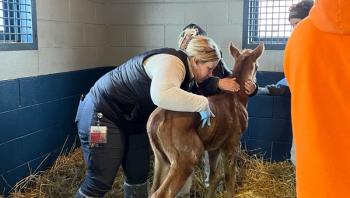
Crawford's nomination lauded by AVMA
CLEVELAND — The American Veterinary Medical Association (AVMA) threw its strong support to President George Bush's nomination of Dr. Lester M. Crawford to lead the Food and Drug Administration (FDA).
CLEVELAND — The American Veterinary Medical Association (AVMA) threw its strong support to President George Bush's nomination of Dr. Lester M. Crawford to lead the Food and Drug Administration (FDA).
If confirmed, Crawford, a 66-year-old veterinarian and pharmacologist, would be the first veterinarian to serve as commissioner of the FDA. He is acting commissioner. (See DVM Newsmagazine's February issue, for an exclusive interview regarding his goals for the agency, or log on
At presstime, confirmation hearings had not been set, but they come on the heels of a $1.9 billion FDA budget proposal to expand food defense and increase drug safety and medical device review. In addition, Congress is holding hearings on the post-drug approval safety questions linked to popular painkillers like Vioxx, Celebrex and Bextra.
A number of groups and politicians support Crawford's nomination, while some Democrats and consumer groups are opposed to it.
Veterinary medicine is squarely in his camp.
A letter from Dr. Bonnie Beaver, president of the AVMA, to Sen. Mike Enzi, chairman of the Senate Committee on Health, Education, Labor and Pensions, states, "Dr. Crawford's exemplary record of service and leadership in public health, food safety and regulatory medicine brings invaluable experience and a myriad of accomplishments in government, academia and industry to this most esteemed position."
AVMA cites Crawford's experience as acting commissioner, deputy commissioner, director of FDA's Center for Veterinary Medicine, administrator of the United States Department of Agriculture's Food Safety and Inspection Service, head of Center for Food and Nutrition Policy at Georgetown University and Virginia Tech, chairman of the University of Georgia's Department of Physiology-Pharmacology and executive director of the Association of American Veterinary Medical Colleges.
Crawford also played a key role in the formation of the World Trade Organization and has been an adviser to the World Health Organization of the United Nations for much of his career.
Mike Leavitt, secretary of Health and Human Services, says in a statement: "Dr. Crawford has dedicated his career to advancing the nation's public health and will lead the way as we enter a new era of individualized medicine and rapidly developing science. With Dr. Crawford's leadership, FDA will provide the world's safest drugs and empower citizens with the tools they need to make to make informed choices about their health," he says.
NOW & THEN ...the early days
Dr. Lester M. Crawford remembers his roots well. In fact, you need to go back to 1962 in his third year of veterinary school at Auburn University's School of Veterinary Medicine to get a glimpse into his young career and sharp sense of humor. Crawford told the story to DVM Newsmagazine during a December interview.
"Very soon after I got into the clinical year. I went to Auburn. There was a big Holstein cow that weighed about 2,000 pounds. She was a prize cow, and in a stall. She was obviously in some pain. These two clinicians were out with the stethoscopes to see what was wrong because she was kicking out her stomach. There are a couple of different things that can cause this kind of syndrome, and they go into shock. So these two younger faculty members diagnosed intussusception. I thought that was brilliant. They told me to run and get the surgery suite ready.
As I was doing so, I ran into Dr. Walter Gibbons, the most pre-eminent veterinary diagnostician of all time. At that time, he was about 65, but he looked like 105; the years had not been kind. He was shuffling along with his briefcase and pipe. He hadn't seen a patient in some years. He said, "Where are you going Crawford?" I said, "I'm going to get the surgery suite ready."
'Why?'
'Because the cow has an intussusception.'
He reached up and grabbed my collar and pulled my ear right next to his mouth and spoke very loudly... 'That cow does not have an intussusception, and that is guaranteed.'
I said, 'Dr. Gibbons you are not within 50 yards of the cow, and you haven't examined the cow, with all due respect, sir.'
He repeated the word, 'Guaranteed.'
Well, we turned her over. The scalpels came out. We looked at every inch of intestine she had -- no intussusception.
The next day, he came in fairly late in the morning. I was tending to the cow.
The diagnosis already had been made; it was indigestion.
He said, 'Do you have an apology to make?'
'Dr. Gibbons, I didn't make that diagnosis.'
He said, 'Well, did you learn anything from it?'
'Yes sir. I learned to listen to you Dr. Gibbons.'
It did teach me that over the experience of time, he knew what he was doing. He wasn't rash. He had spent thousands and thousands of hours dealing with every known kind of case, particularly with cattle.
That lesson of experience and hard work made him what he was. He was a genius, and he wrote all of the books on diagnostics.
He died in 1970. He came to Auburn from Cornell to save us, and he did.
I never forgot that, he was a great inspiration to everybody."
Newsletter
From exam room tips to practice management insights, get trusted veterinary news delivered straight to your inbox—subscribe to dvm360.






